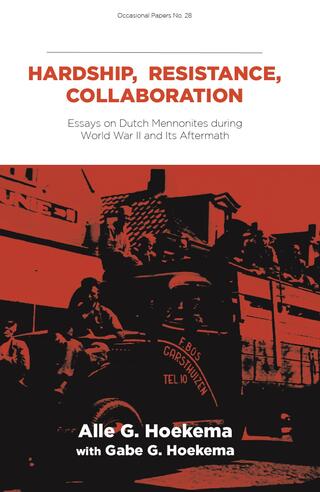
Jamie Pitts, PhD (at right), Director of the Institute of Mennonite Studies, converses with Alle Hoekema, PhD (on screen), as part of presenting Hoekema’s new book, Hardship, Resistance, Collaboration: Essays on Dutch Mennonites during World War II and Its Aftermath, to the AMBS community during a book launch event on Oct. 27. (Credit: Melissa Troyer)
By David C. Cramer for the Institute of Mennonite Studies
ELKHART, Indiana (Anabaptist Mennonite Biblical Seminary) — On Wednesday, Oct. 27, the Institute of Mennonite Studies (IMS) and the AMBS Bookstore hosted Dutch Mennonite missiologist Alle Hoekema, PhD, on a video call from the Netherlands to celebrate the release of Hoekema’s new IMS publication, Hardship, Resistance, Collaboration: Essays on Dutch Mennonites during World War II and Its Aftermath.
The book, published by IMS as volume 28 of the Occasional Papers series, comprises seven essays about the Dutch Mennonite experience in the 1940s, including five essays appearing for the first time in English and one written by Hoekema’s brother Gabe. Together these essays tell the stories of various responses of Dutch Mennonites to German occupation in the 1940s — from aiding Jewish refugees (including many children) to escape deportation to, in some cases, expressing open support for the Nazi party. The book concludes with an essay on Dutch Mennonite conscientious objectors to the Indonesian War of Independence from the Dutch Empire in the immediate aftermath of World War II.
At the book launch event, Jamie Pitts, PhD, Associate Professor of Anabaptist Studies and IMS Director, introduced Hoekema to the AMBS faculty, staff and students gathered in the seminary lounge. Pitts described how Hoekema had proposed the idea of collaborating on the book when they met prior to the COVID-19 pandemic at a reception at the Free University of Amsterdam, where Hoekema (now retired) taught theology and missiology.
Joining from his home in the Netherlands, Hoekema described how his interest in the Dutch Mennonite experience during World War II began around fifteen years ago when, by chance, he found a handwritten diary of a Dutch Mennonite minister’s wife in The Hague. The diary was written between 1940 and 1945 and is now housed in the archives of the Dutch National Holocaust and War Institute in Amsterdam. This discovery — along with related work in editing and publishing the minutes of a group inspired and led by Mennonite peace activist Cor Inja that tried to assist Jewish refugees from 1938 through the war — formed the basis for Hoekema’s initial research on this era.
 Hoekema shared how, through his research, he was able to establish contact with surviving German-Austrian refugee children — now in their 90s — who had been aided by Dutch Mennonites. He and his wife, Aukje, were even able to visit one of them, Olga Visser-Pollak, in Kalamazoo, Michigan, before her death in 2016 at age 91.
Hoekema shared how, through his research, he was able to establish contact with surviving German-Austrian refugee children — now in their 90s — who had been aided by Dutch Mennonites. He and his wife, Aukje, were even able to visit one of them, Olga Visser-Pollak, in Kalamazoo, Michigan, before her death in 2016 at age 91.
Reflecting on the contribution that Hardship, Resistance, Collaboration makes to Mennonite and World War II scholarship, Hoekema identified several unique aspects of the Dutch Mennonite experience. First, Dutch Mennonites tended to be politically and theologically more liberal than North American and Southern European Mennonites prior to the war, finding themselves somewhat marginalized from majority Mennonite life at the time. Likewise, they were less ethnically Mennonite, as many Dutch joined the Mennonite Church from other denominations during its period of growth in the 19th century. Moreover, due to legally recognized religious tolerance in the Netherlands, there had already been significant interaction between Dutch Mennonites and Jews — including intermarriages — prior to the war. And, finally, the Dutch had their own sense of national pride, did not feel part of the German-speaking empire, and therefore did not generally view Nazi occupation positively.
By highlighting these unique traits of Dutch Mennonites, Hoekema hopes that the book demonstrates how people from the same religious tradition behave differently in light of their differing social and political contexts. He encouraged future research on Swiss and French Mennonites during World War II to expand the picture of Mennonite responses to Nazism.
Hardship, Resistance, Collaboration comes two decades after IMS’s first collaboration with Hoekema, Dutch Mennonite Mission in Indonesia: Historical Essays (Occasional Papers, vol. 22). Both can be purchased through the AMBS Bookstore.
The Institute of Mennonite Studies is the research and publishing wing of AMBS. Founded in 1958 under the directorship of Cornelius J. Dyck, IMS promotes scholarship in Mennonite and Believers Church theology, history, biblical studies, peace studies and related fields, primarily through the publication of books and journals and the organization of conferences.
Want to receive AMBS news and updates via email? Subscribe here.
